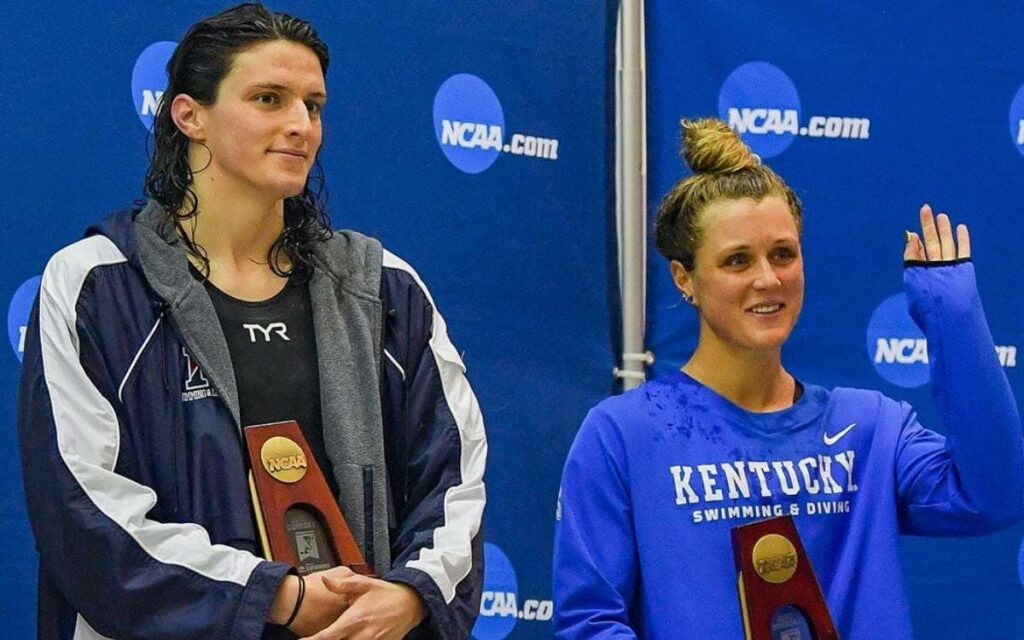
Riley Gaines, a former competitive swimmer and an advocate for women’s rights in sports, has recently called out Whoopi Goldberg in a fiery exchange that has sent shockwaves across social media. The athlete, who has been vocal about her opposition to the inclusion of transgender women in women’s sports, labeled Goldberg as a “disgrace to real women”, a phrase that has both captivated and divided audiences.
The tension began when Whoopi Goldberg, known for her bold opinions as a co-host of The View, defended the rights of transgender women in a segment addressing inclusivity and representation. Goldberg emphasized that embracing all identities within the broader scope of womanhood is an essential step toward equality. However, her comments didn’t sit well with Gaines, who took to social media to express her disdain for Goldberg’s stance.
“Whoopi Goldberg, you are a disgrace to real women,” Gaines tweeted, her words laced with indignation. She went on to criticize Goldberg for what she described as “diminishing the achievements and struggles of biological women”. According to Gaines, the conversation about gender inclusivity should not come at the expense of the hard-fought battles that women have endured throughout history.
The backlash from Gaines echoes a sentiment shared by many who fear that the inclusion of transgender athletes could potentially erase the competitive integrity of women’s sports. Gaines herself has been a staunch advocate for creating distinct categories in athletics, ensuring fairness while also respecting the rights of transgender individuals. This latest confrontation with Goldberg, however, marks a significant escalation in her campaign.
Goldberg, true to form, did not back down. During an episode of The View, she responded indirectly to Gaines’ remarks, stating, “What makes a woman is not up for anyone else to decide. Womanhood is vast, it is inclusive, and it cannot be boxed into one single definition.” Her comments were met with applause from the studio audience, but online, reactions were far more polarized.
Critics of Goldberg accused her of being out of touch with the realities faced by women in competitive environments, while her supporters hailed her as a champion of equality and understanding. On the other hand, Gaines’ remarks have been lauded by some as a courageous stand for biological women, though detractors labeled her views as transphobic and exclusionary.
This clash between Gaines and Goldberg reflects a broader cultural debate that has gripped society in recent years. At its core, the argument revolves around what it means to be a woman and whether biological sex or gender identity should take precedence in certain spaces. For Gaines, the issue is deeply personal. As a former collegiate swimmer, she has spoken openly about competing against transgender athletes and the frustrations she felt about what she perceives as an uneven playing field.
Goldberg, on the other hand, has long been an advocate for marginalized communities and sees inclusivity as a moral imperative. Her argument is rooted in the belief that society must evolve to embrace all forms of identity, even if it challenges long-standing norms.
The conversation surrounding this controversy has spilled over into wider public discourse, with both women gaining widespread media attention for their comments. Social media platforms like Twitter and Instagram have become battlegrounds for supporters and critics alike, as hashtags like #StandWithRiley and #InclusivityMatters trend nationwide.
What makes this debate particularly intriguing is the dynamic between these two figures. Gaines represents the younger generation’s call for preserving traditional boundaries, while Goldberg embodies the seasoned, progressive voice urging society to move forward. Their clash is not just about women’s rights—it’s a microcosm of the larger ideological struggles defining modern culture.
In the end, the exchange between Riley Gaines and Whoopi Goldberg underscores an undeniable truth: the conversation about gender and inclusivity is far from over. Whether you align with Gaines’ demand for fairness in competition or Goldberg’s plea for inclusivity, one thing is clear—this debate has only just begun.











